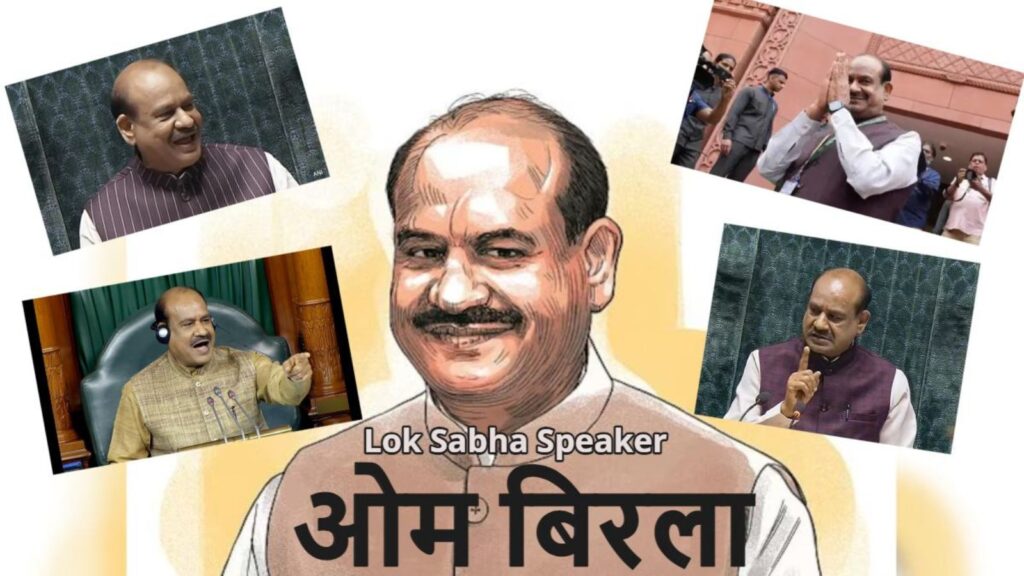Om Birla Becomes Lok Sabha Speaker for the Second Time
BJP MP Om Birla has been elected as the Speaker of the 18th Lok Sabha after Prime Minister Narendra Modi moved a motion to elect the NDA candidate for his second term.
Lok Sabha Speaker:-
The Speaker of the Lok Sabha is the constitutional and ceremonial head of the House who is primarily responsible for managing the affairs of the Lok Sabha.
Presiding Officer: The Speaker of the Lok Sabha is the presiding officer of the Lok Sabha and in his absence the Deputy Speaker of the Lok Sabha acts as the presiding officer of the House.
Constitutional Provisions: Article 93 of the Indian Constitution deals with the offices of both the Speaker and the Deputy Speaker of the Lok Sabha.
Historical background of the post of Speaker of Lok Sabha:-
Government of India Act of 1919 (Montagu-Chelmsford Reforms): Under its provisions, the posts of Speaker and Deputy Speaker of the Lok Sabha were created in 1921.
However, at that time, the posts of Speaker and Deputy Speaker of the Lok Sabha were called President and Vice-President respectively.
Government of India Act of 1935: It changed the names of President and Vice President to President and Vice President respectively.
However, the old nomenclature continued until 1947.
Election for the post of Speaker of Lok Sabha:-
Qualification: As per the Constitution of India, the Speaker must be a member of the House (Lok Sabha).
Convention: A tradition has developed where the ruling party nominates its candidate after informal consultation with leaders of other parties and groups in the House.
In this way, the elected Speaker of the Lok Sabha gets the respect and obedience of all the members of the Lok Sabha.
Election Process: The Speaker of the Lok Sabha is elected from among all other members by a simple majority of the members present and voting in the House.
Generally, the Speaker belongs to the majority ruling party. However, there are some cases when the elected Speaker did not belong to the majority ruling party of the Lok Sabha.
For example- G. M. C. Balayogi, Manohar Joshi, Somnath Chatterjee.
Terms of office of Speaker of Lok Sabha:-
Term of office: The Speaker holds office from the date of his election until immediately before the first meeting of the next Lok Sabha.
Even after the dissolution of the Lok Sabha, the Speaker does not vacate his office and continues to hold office till the meeting of the newly elected Lok Sabha.
This means that his post is beyond the terms of the Lok Sabha.
Eligibility for re-election: The Speaker of the Lok Sabha is also eligible for re-election.
Role and powers of the Chairman:-
Explanation: He is the final interpreter of the provisions of the Constitution of India, the rules of procedure and conduct of business of the Lok Sabha and parliamentary matters inside the House.
He often gives decisions in matters of interpretation of these provisions which are respected by the members and which are binding in nature.
Joint sitting of both the houses: He presides over the joint sitting of both the houses of the Parliament.
Such meetings are called by the President to resolve the deadlock between the two Houses on a bill.
Adjournment of the House: He can adjourn the House or adjourn the meeting in the absence of one-tenth of the total strength of the House (called quorum).
Casting vote: The Speaker does not vote in the first instance but in case of a tie (when the House is equally divided on a question) the Speaker has the right to vote.
Such a vote is called casting vote, the purpose of which is to resolve the deadlock.
Money Bill: He decides whether a Bill is a Money Bill or not and his decision on this question is final.
Disqualification of members: Under the provisions of the Tenth Schedule, the Speaker alone decides on the question of disqualification of a member of the Lok Sabha arising on the basis of defection.
This power is vested in the President by the 52nd Amendment to the Indian Constitution.
The Supreme Court ruled in the year 1992 that the decision of the Speaker in this regard is subject to judicial review.
Chairmanship of the IPG: The Speaker serves as the ex-officio Chairman of the Indian Parliamentary Group (IPG), a link between the Parliament of India and the parliaments of the world.
He also serves as the ex-officio Chairman of the Conference of Presiding Officers of Legislative Bodies in the country.
Formation of Committees: Committees of the Lok Sabha are constituted by the Speaker and work under his direction.
Through this, chairmen of all parliamentary committees are nominated.
Committees like Business Advisory Committee, General Purposes Committee and Rules Committee work directly under its chairmanship.
Privileges of the Speaker: The Speaker is the custodian of the rights and privileges of the House, its committees and members.
Removal of the Chairman:-
Generally, the Speaker of the Lok Sabha remains in his post for the tenure of the Lok Sabha. However, the Speaker may have to vacate his office before the end of the term of the Lok Sabha under the following conditions:
If he is no longer a member of the Lok Sabha.
If he resigns by writing a letter to the Vice President.
If he is removed by a resolution passed by a majority of all the members of the Lok Sabha.
Notification: Such a motion can be moved only after giving 14 days’ advance notice to the Speaker.
When a motion for the removal of the Speaker is under consideration of the House, he may be present at the meeting but may not preside.
Way forward:-
Role in dispute resolution: In a coalition government, where multiple parties with different ideologies and agendas come together, conflicts and disputes are inevitable. The Speaker of the Lok Sabha must maintain impartiality in mediating these disputes and finding a solution acceptable to all stakeholders.
Influence on legislative outcomes: By controlling the legislative agenda, the Speaker of the Lok Sabha can influence the passage of bills and the overall policy direction of the government.
Former President of India Pranab Mukherjee said, “The role of the Speaker is not limited to just running the House; But also to build a bridge between the government and the opposition and ensure that the democratic process is maintained”.
Ensuring non-partisanship: To ensure complete non-partisanship, the practice of the Speaker of the Lok Sabha resigning from his political party can be carried forward to maintain the principle of separation of powers of the Constitution.
On becoming the Speaker of Lok Sabha in the year 1967, N. Sanjeev Reddy’s resignation from his party sets a positive example of non-partisan conduct.
Conclusion:-
The Speaker of the Lok Sabha is not merely the presiding officer but has the power to shape the functioning of the House and influence the balance between the ruling party and the opposition, especially in the case of a coalition government. The decisions and actions of the Speaker can have far-reaching effects on the functioning and stability of the government.




